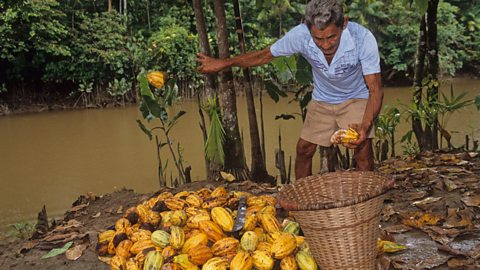The tropical rainforest - how it helps humans
Tropical rainforests all over the world have immense importance as they provide a life support system for the planet as well as goods and services to the people who live in them.
Life support systems
Tropical rainforests act as life support systems for the planet as they:
- Regulate the composition of the atmosphere - all tropical rainforests, such as the Amazon, help to offset the effects of climate change by taking in carbon dioxide through photosynthesisA chemical process used by plants to make glucose and oxygen from carbon dioxide and water, using light energy. Oxygen is produced as a by-product of photosynthesis. Algae subsumed within plants and some bacteria are also photosynthetic. and releasing oxygen, thereby regulating levels of carbon dioxide in the atmosphere.
- Maintain soil health - in areas such as the Amazon, tropical rainforests have produced rich fertile top soils due to the rapid leaf fall and decomposition which rapidly recycles nutrients. These soils can be used to grow cassava and maize which is the staple diet of the local people.
- Influence the hydrological cycle - rainforests help to provide water for people. Trees act as a water store by intercepting rainfall. They release water into the atmosphere by evapotranspiration (evaporation and transpiration). This then falls again as precipitation and so gives the people living in areas such as the Amazon a constant supply of water. The tree roots also increase infiltration, allowing increased amounts of water to percolate to groundwater stores and develop aquifers.
Goods and services
Tropical rainforests provide many goods and services such as:
- Food - rainforests can produce food, such as nuts which forms part of the diet of local people in the Amazon.
- Cash crops - rainforests also produce cash crops, such as the development of wild coffee that resists disease and has a higher yield than the Arabica beans traditionally used by growers in the rest of Brazil.
- Medicines - rainforests have also been used to search for medicines. For example, the rosy periwinkle from the rainforests of Madagascar (which can be poisonous) can help treat childhood leukaemia
- Raw materials - rainforests can be logged to produce timber such as hardwoods for garden furniture exports. In Indonesia, oil palm plantations cover 7.8 million hectares and employ over 2 million people, making up 7% of Indonesia's exports, valued at $12 billion. Palm oil is used in cosmetics, confectionary, detergents and many other products.

A man harvests cocoa in the Amazon